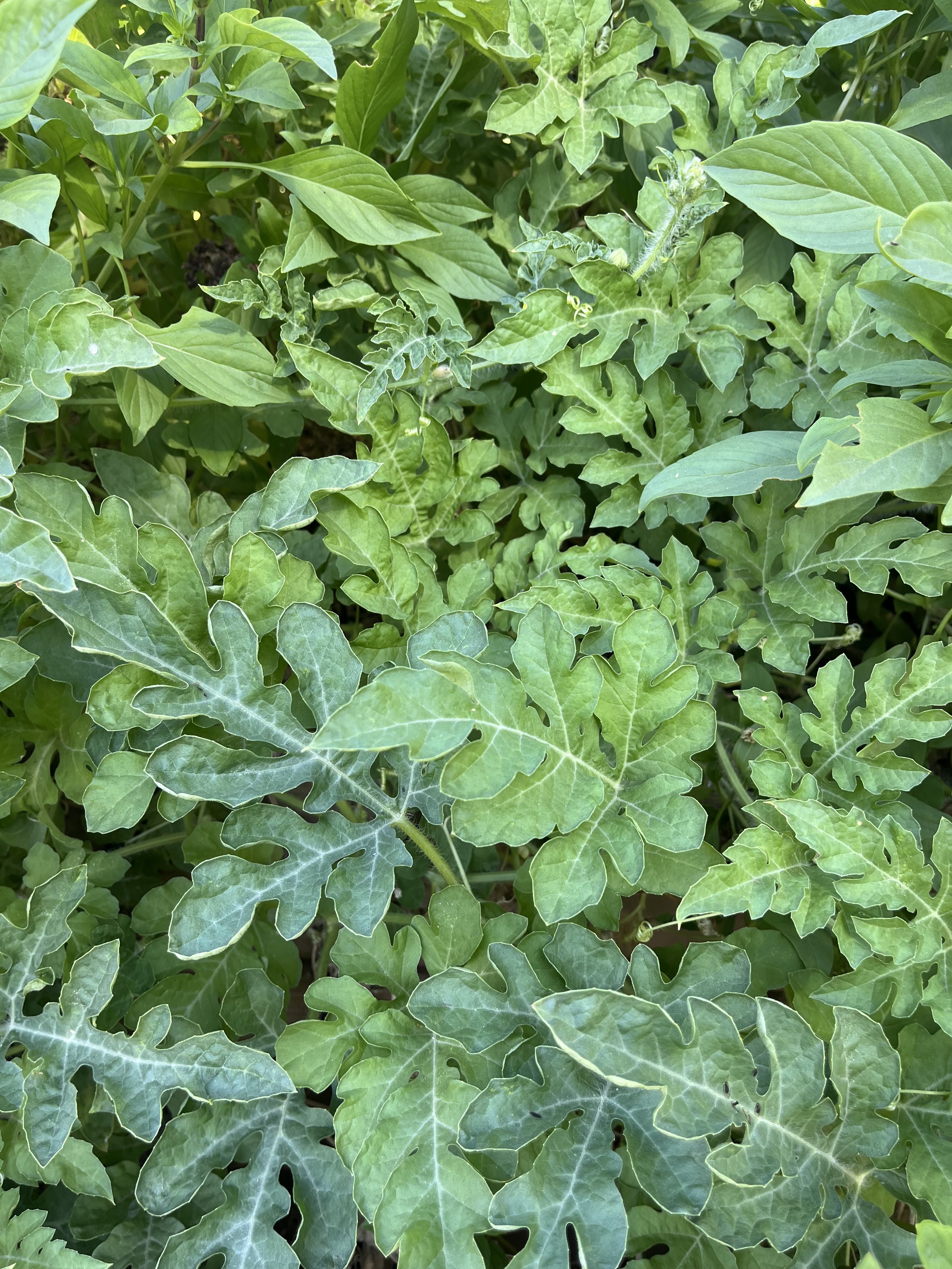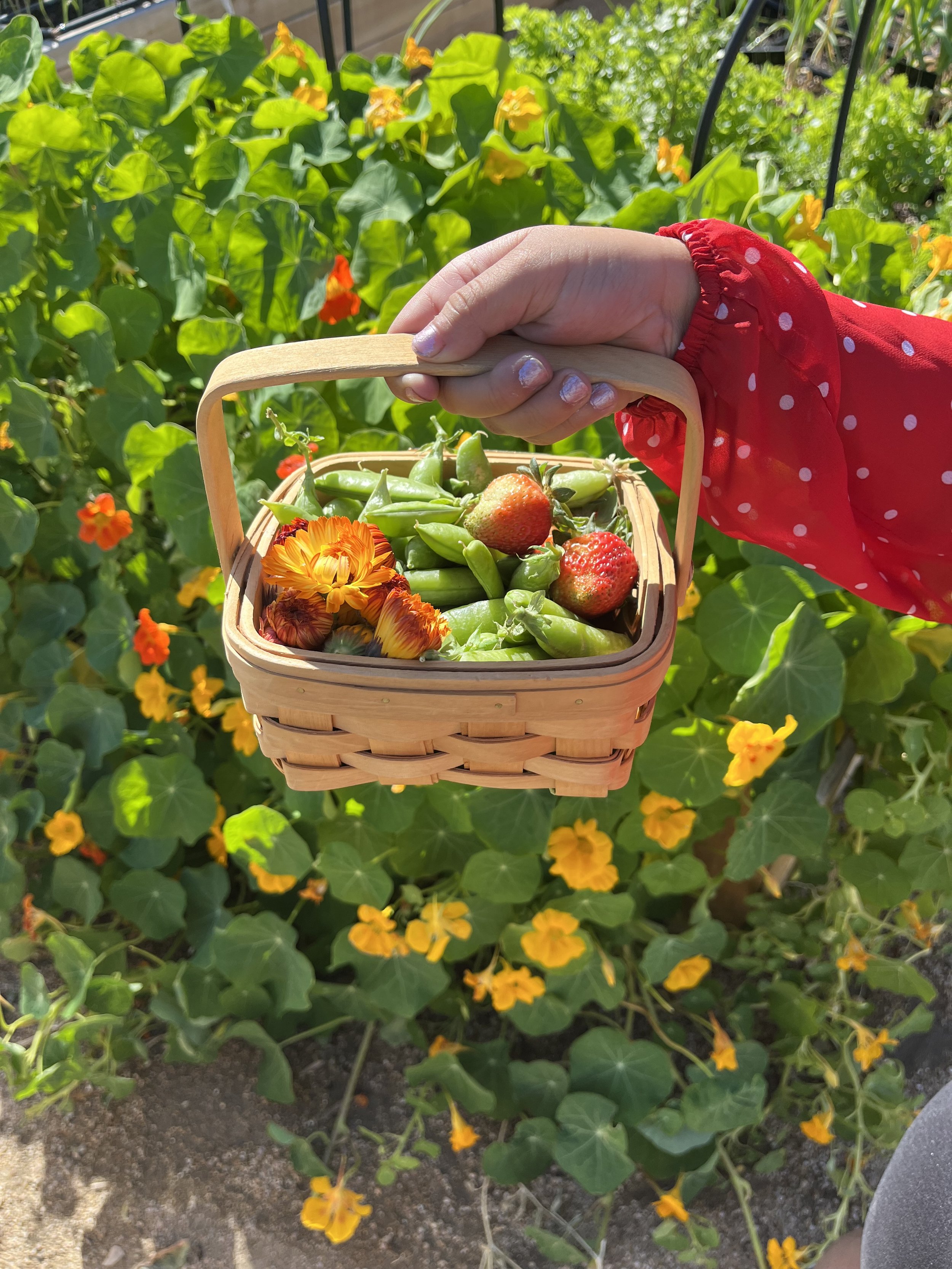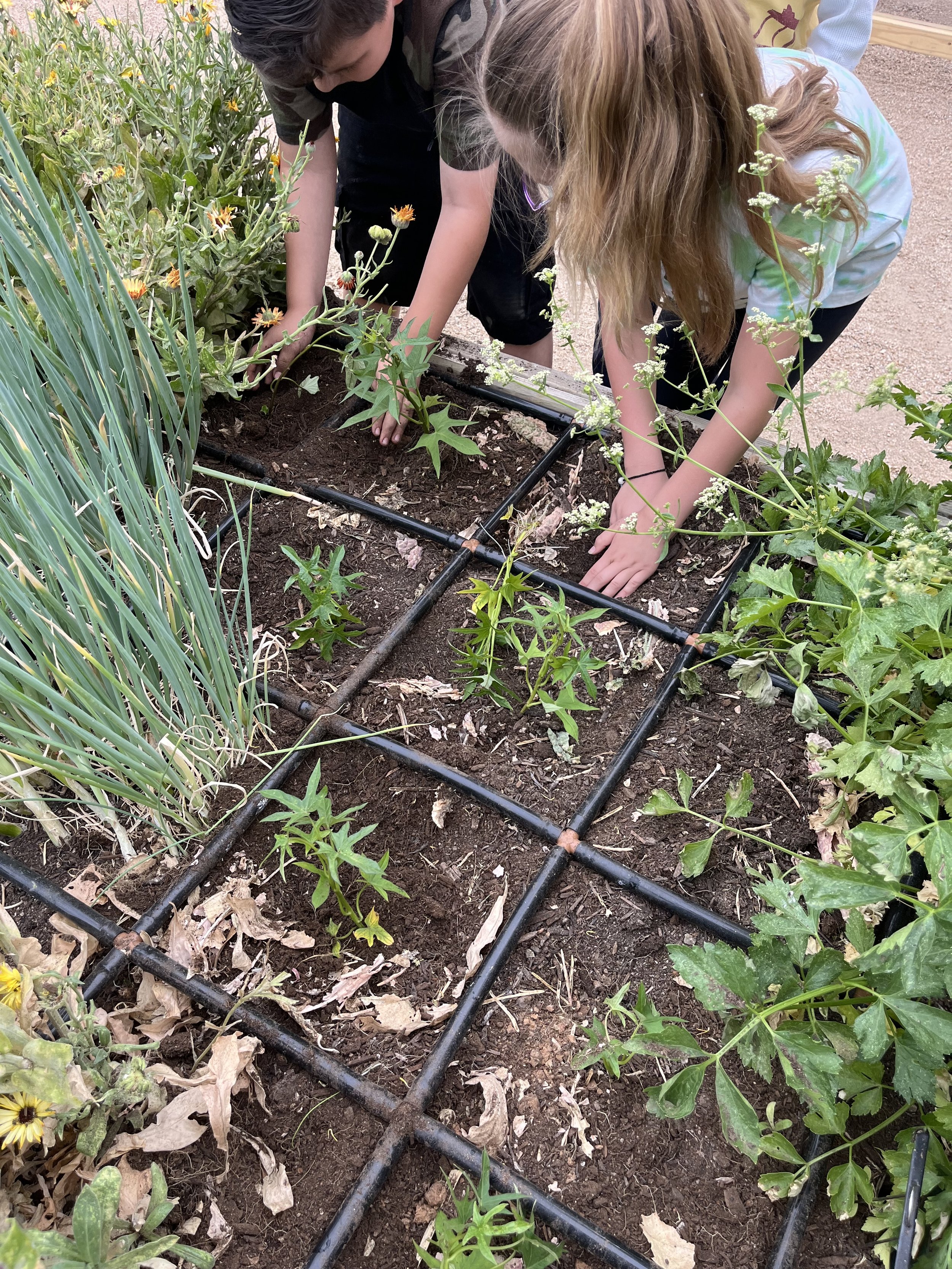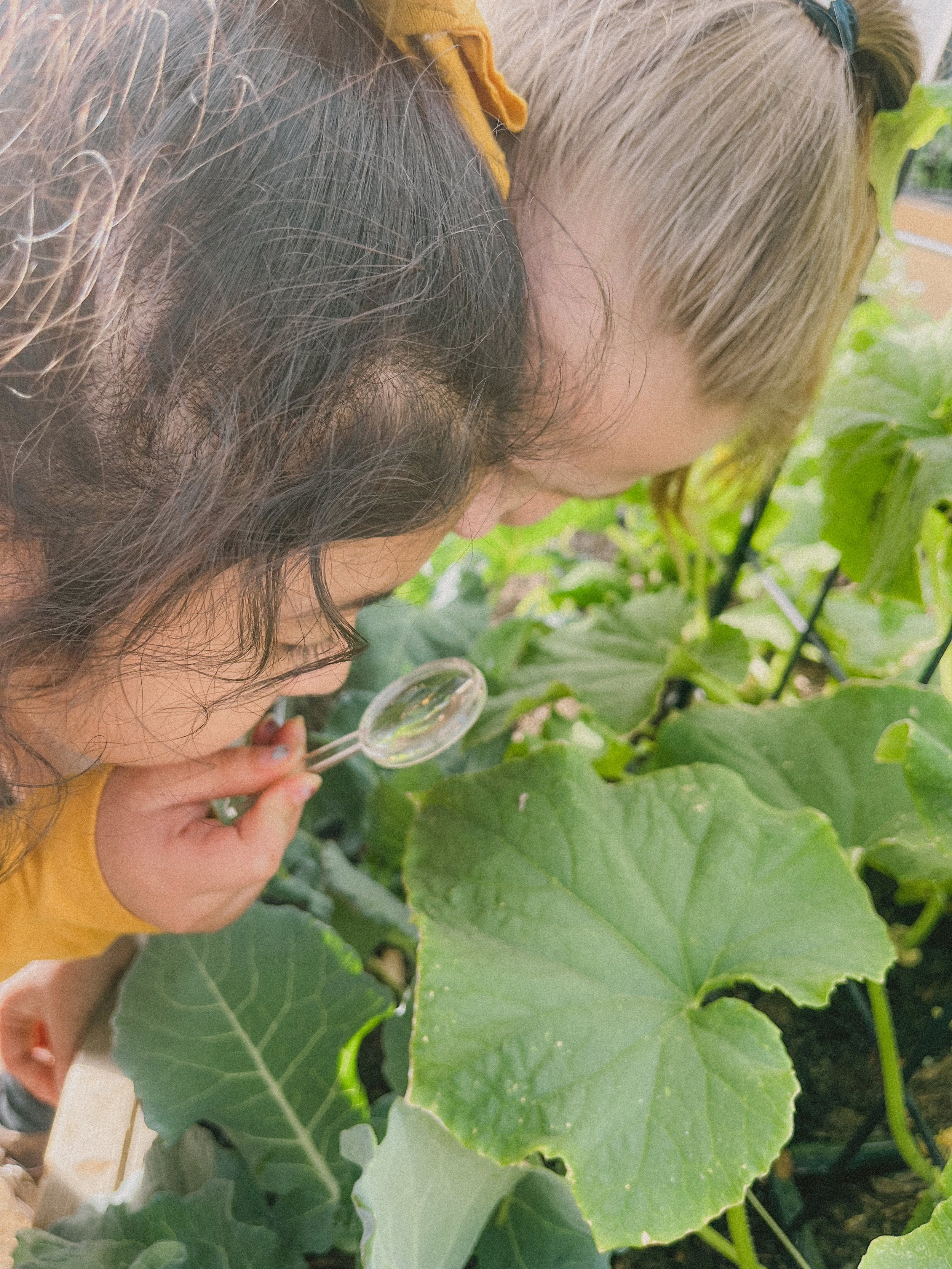Hi, I’m Loretta.
I’m a former first-grade teacher, garden educator, and the founder of Teaching Tiny Botanists—a hands-on program rooted in the belief that children learn best when they’re connected to the natural world. I’ve spent the past several years weaving together my passions for teaching, sustainability, and community to create joyful, meaningful learning experiences for young children.
I grow food, flowers, and future stewards of the earth. Whether I’m leading a compost lesson, planting seeds with students, or partnering with local chefs and farmers, my work is always centered on nurturing curiosity, creativity, and care.
Over the years, I’ve designed and implemented hands-on lessons that integrate science, sustainability, literacy, and food education—earning multiple grants and community partnerships to support this work.
With years of experience in both farming and teaching, I’ve created a space where children can learn through touch, taste, movement, and observation. My work is rooted in the belief that childhood should be full of magic—and nature is the perfect guide.
Through Teaching Tiny Botanists, I hope to offer children and families in Phoenix a chance to slow down, dig deep, and discover the magic that lives in the soil—and in themselves.
Teaching Tiny Botanists
Teaching Tiny Botanists is a nature-based learning experience designed for young children to connect with the world around them through gardening, exploration, and hands-on discovery. Rooted in curiosity, sustainability, and joy, our programs nurture a love for plants, food, and the natural world—one tiny botanist at a time.
Whether we’re planting seeds in a garden bed, observing worms in compost, or harvesting herbs to make tea, your child will be immersed in meaningful, age-appropriate activities that foster a deep appreciation for life cycles, food origins, and the rhythms of nature.
““Teaching children about the natural world should be treated as one of the most important events in their lives.”
”

Look deep into nature, and then you will understand everything better.”
— Albert Einstein
What You Can Expect:
-

Hands-On Garden Time
Children get their hands dirty tending real gardens, planting seeds, harvesting crops, and learning how plants grow.
-

Creative Nature Projects
Art, journaling, and simple science experiments that help children reflect and express what they observe.
-

Seasonal Learning
Every season offers new opportunities—from planting sunflowers to collecting seeds and watching pollinators in action.
FAQs
What is Teaching Tiny Botanists?
Teaching Tiny Botanists is a hands-on, garden-based program designed to help young children build a deeper connection with nature, food, and sustainability. Through seasonal lessons held in community gardens across the Valley, children engage in joyful learning experiences that nurture curiosity, creativity, and care for the environment.
What will my child be doing?
Each session offers a blend of outdoor learning and creative expression. Children will:
Plant seeds and harvest flowers or vegetables
Observe bugs, worms, and pollinators
Learn about soil, compost, and plant life cycles
Cook or taste garden-grown foods
Make nature-based art and keep journals
Practice teamwork and mindfulness outdoors
Is the program safe for kids in the summer heat?
Yes. Safety is our top priority. We:
Schedule classes in shaded areas and during cooler hours
Take regular hydration and rest breaks
Keep group sizes small
Follow strict sun safety and emergency protocols.
What if my child has allergies or special needs?
Please let us know during registration. We strive to create an inclusive and safe space for every child and will work closely with you to support your child’s needs.
What age group is this program for?
Our program is designed for children between 5 and 10 years old. Activities are intentionally created to match this age group's developmental needs—blending science, art, and play in a garden setting.
What are the benefits of garden-based learning?
Children gain:
A sense of responsibility and wonder for living things
Greater comfort and confidence outdoors
Hands-on science and environmental knowledge
Improved focus, resilience, and collaboration
Real-world lessons in food, health, and sustainability.
Are snacks or meals provided?
We do not provide snacks, but students are welcome to bring their own. Occasionally we will offer garden tastings (like mint tea or cucumbers from the garden) with prior parent consent.
How do I sign up?
You can register through our website or request a form via email. Space is limited to keep class sizes small, so early sign-up is recommended.
Where do sessions take place?
We host classes in community gardens around the Phoenix area (including Mesa, Tempe, and Central Phoenix). Exact garden locations will be shared upon registration.
What should my child bring?
Please pack:
A reusable water bottle
A hat and sunscreen
Comfortable clothes that can get messy
Closed-toe shoes for safety
A small snack (nut-free)
Who teaches the classes?
Sessions are led by Loretta Lyken, a seasoned early childhood educator and garden program leader, supported by a team of thoughtfully selected volunteers and interns. All adults working with children have passed background checks, hold current CPR certification, are trained in garden safety, and possess a valid fingerprint clearance card.
Upcoming Classes
-
Class 1: What Is Soil, Really?
Tentative Date: July
Theme: Soil as a Living World
Duration: 1 hourOverview: We break open the myth that soil is just “dirt.” Through hands-on exploration, kids discover soil’s textures, smells, and magic.
Activities:
Listen & Wonder: Storytime
Soil Station Exploration: Feel and compare sand, silt, clay, and loam
Soil Senses Game: Smell jars, touch bins, mystery object dig
Soil Painting
Closing Circle: Ask, “What do you think lives inside soil?”
Key Concept:Soil is alive and made of many parts!
Class sizes are intentionally small to create a calm, enriching experience for each child. We’re only accepting 12 children per age group, so spots will go quickly!
-
Class 2: Soil Creatures & Compost Magic
Theme: Decomposition + Soil Life
Duration: 1 hourOverview: This session is all about what’s under the surface—meet the critters and fungi that turn scraps into soil.
Activities:
Listen & Wonder - Storytime
Worm Bin Peek + Observation Drawings
Compost Layer Relay: Build a compost pile in teams (greens/browns)
Mini Decomposer Dioramas: Use found materials + clay to model decomposer scenes
Closing Song or Poem: “Rot Rock Anthem” – a silly compost chant
Key Concept: Soil is built by tiny creatures and food scraps—it’s a living cycle!
-
From Scraps to Soil: The Life of Leftovers
Theme: Composting & Decomposition
Duration: 1 hourOverview: What happens to old banana peels, fallen leaves, and leftover lunch? In this workshop, kids discover the quiet magic of decomposition and meet the tiny creatures that turn waste into rich, living soil.
Activities:
Listen and Wonder: Storytime
Decomposer Detective Hunt: Explore compost trays or bins with magnifying glasses to find worms, mold, bugs, or sprouting seeds.
Closing Reflection: Ask: “Why are decomposers like heroes for the Earth?”
Key Concept: Decomposition isn’t dirty—it’s how nature recycles and rebuilds the soil we all depend on.
Sign up for our email newsletter to stay in the loop!
-
At Teaching Tiny Botanists, we believe children thrive when they learn through play, nature, and place-based exploration. Our classes are designed to spark curiosity, cultivate wonder, and connect children to the natural world around them through immersive, sensory-rich experiences.
-
Small class sizes that allow for meaningful connection
Outdoor learning in real garden and green spaces
Opportunities for every child to feel seen, heard, and inspired
Time to slow down, notice, and wonder
Creating experiences that stay with children long after class ends
-
To nurture wonder, deepen connection to the natural world, and empower children through hands-on, place-based learning rooted in curiosity, care, and community.
-
Nature as Teacher: We believe the garden is a living classroom where every rock, worm, and seed tells a story.
Place-Based Learning: Children learn best when grounded in the rhythms, plants, and seasons of their local environment.
Hands-On Discovery: Little hands learn big things through digging, touching, observing, and creating.
Joyful Curiosity: We celebrate questions, not just answers.
Community & Care: We foster kindness, respect, and a sense of stewardship—toward ourselves, each other, and the earth.
Contact Us
Hours
Monday–Friday
10am–6pm
Phone
(562)386-3144
Email:
teachingtinybotanist@gmail.com
Location
Coming soon
















